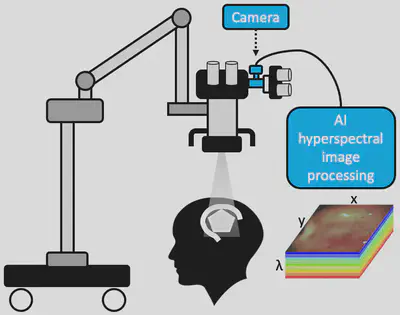Research Associate in "Biomedical Optics - Hyperspectral Imaging"
Post overview:
- Focus: Translational research in biomedical optics for hyperspectral imaging based quantitative fluorescence linked with an in-patient neurosurgery clinical study
- Line manager: Tom Vercauteren
- Clinical collaborator: King’s College Hospital
- Industry collaborator: Hypervision Surgical
- Salary: Grade 6, £38,826 - £45,649 per annum, including London Weighting Allowance

Job description
We are seeking a biomedical optics researcher to design and translate the next generation of hyperspectral imaging systems for surgical guidance using quantitative fluorescence. The postholder, based within the Department of Surgical & Interventional Engineering at King’s College London, will play a key role in a collaborative project with King’s College Hospital and work closely with the project’s industrial collaborator Hypervision Surgical, a recently founded King’s spin-out company. A clinical neurosurgery study has been set up to underpin this collaboration.
Brain tumour surgery involves removing as much of the tumour as safely as possible. However, even with the best hands and the most modern technology currently available, it is often not possible to reliably identify tumour during surgery. Hyperspectral imaging (HSI) has the potential to enhance the surgeon’s vision to reliably identify tumour and healthy brain structures through the use of quantitative fluorescence. Acquiring HSI in real-time through the surgical microscope (the workhorse of modern neurosurgical practice) nonetheless remains complex and requires careful optimisation of the imaging pipeline as well as an improved understanding of light-tissue interaction.
Key activities relate to the design and characterisation of the HSI image acquisition system to be integrated on the surgical microscope as well as the development of improved biophotonics light-tissue interaction models to achieve accurate quantitative fluorescence extraction. Phantom work will also be used for validation purposes. The recruited individual will complement our multidisciplinary team and undertake research on biophotonics for computer-assisted interventions.
The post involves close and active collaboration with AI researchers, biomedical engineers, and clinicians. The close collaboration between King’s College London, King’s College Hospital and Hypervision Surgical Ltd will ensure a fast-tracked conversion from the research development into products achieving accelerated patient and public benefit.
This post will be offered on a fixed-term contract for 18 months. This is a full-time or part-time post – 50-100% full time equivalent.
Key responsibilities
- Develop hyperspectral imaging instruments
- Contribute to project management tasks
- Maintain accurate and up-to date technical documentation of the delivered hardware
- Contribute to the dissemination of the research through publications, conferences and public engagement activities
The above list of responsibilities may not be exhaustive, and the post holder will be required to undertake such tasks and responsibilities as may reasonably be expected within the scope and grading of the post.
Skills, knowledge, and experience
Essential criteria
- PhD or equivalent industrial experience in optics or a closely related field
- A demonstrable record of publications in peer-reviewed conference proceedings and scientific journals
- Experience working on system integration tasks as part of multidisciplinary teams
- Expertise in computational modelling and simulation for biomedical optics
- Experience in collecting and analysing experimental data
Desirable criteria
- Knowledge of and experience of software development for biophotonics
- Previous experience developing a biomedical imaging system for surgery
- Experience with supervision of graduate and undergraduate students
Please note that this is a PhD level role but candidates who have submitted their thesis and are awaiting award of their PhDs will be considered. In these circumstances the appointment will be made at Grade 5, spine point 30 with the title of Research Assistant. Upon confirmation of the award of the PhD, the job title will become Research Associate and the salary will increase to Grade 6.
More information about the position and how to apply here or here.